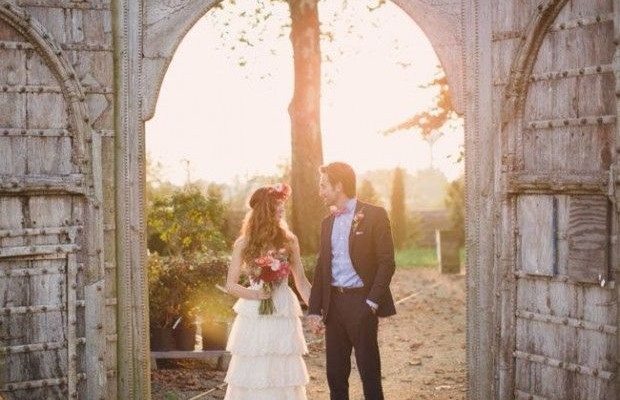The second route can be tricky, though, because many religions simply won’t honor a wedding that doesn’t conform to their own strict guidelines. For that reason, you’ll want to run your plans by potential officiants and church leaders to make sure that any blended wedding can be recognized by both faiths. Needless to say, the average couple won’t want to invest the substantial time and money a wedding involves on a ceremony that ends up not being recognized by their respective churches.
Whether a couple decides to stay non-denominational, blend two religions into a ceremony of great personal meaning that may not be recognized by either faith, or even hold two separate religious ceremonies, it’s important to remember their love for each other is just as important as their love of their faith.
If faith plays a very strong role in their lives, and the couple wishes to have their wedding recognized by both their churches, they’ll probably need to take a few extra steps. In fact, sometimes the only way to make this happen is to hold two ceremonies, one in each church. This may seem a bit extreme. But for many religions, the definition of a wedding within their faith is a wedding that takes place within their walls. It’s simply not possible to do this for two religions unless the couple is willing to go to the time and trouble of two separate ceremonies.
An alternative, albeit also extreme to some, is to have a nondenominational wedding that only the government will recognize. This is a popular option for couples that simply don’t have the time or the budget for two separate ceremonies. Although this choice removes several obstacles, it can also be a painful compromise when neither church recognizes the union. In this case, the couple often feels their love for each other fully sanctifies the marriage and the approval of their churches is not necessary.
Still another alternative is to hold a nondenominational wedding outside the church walls — for example, in a beautiful backyard or a park. With this type of ceremony, the couple has no restrictions and can weave either religion into the ceremony in any way they wish. Still, the traditional prayers and religious hymns are perfectly at home in a nondenominational ceremony. Although the church won’t recognize this type of wedding, the couple is still free to incorporate the customs and observances from their faiths into a beautiful ceremony that honors both religions.
A final option is to let one faith fully dominate the wedding ceremony and the other, the reception. One happy result is that this allows at least one of the religions to recognize the marriage, while the customs and heritage of the other family is well-represented throughout the reception, hopefully staving off any feeling of neglect. Still, this option will only work if the bridal member whose religion won’t be recognized is completely accepting and understanding of that fact. The importance of genuine acceptance can’t be overstated, because if a couple paves over any hard feelings, the jealousy and resentment could cause them problems for years.
The number of interfaith couples is clearly on the rise. Years ago, it seemed unheard of to marry outside of your faith, but things have changed, and many of today’s couples are interfaith. Although it’s often tricky, it’s usually possible to blend the two faiths in a way that satisfies all parties. The only drawback is the forementioned issue, that many churches won’t choose to recognize a blended wedding. More and more, today’s couples decide that their mutual happiness carries more weight than a recognized union, and sometimes they even opt for a ceremony that’s totally devoid of religious observances.


